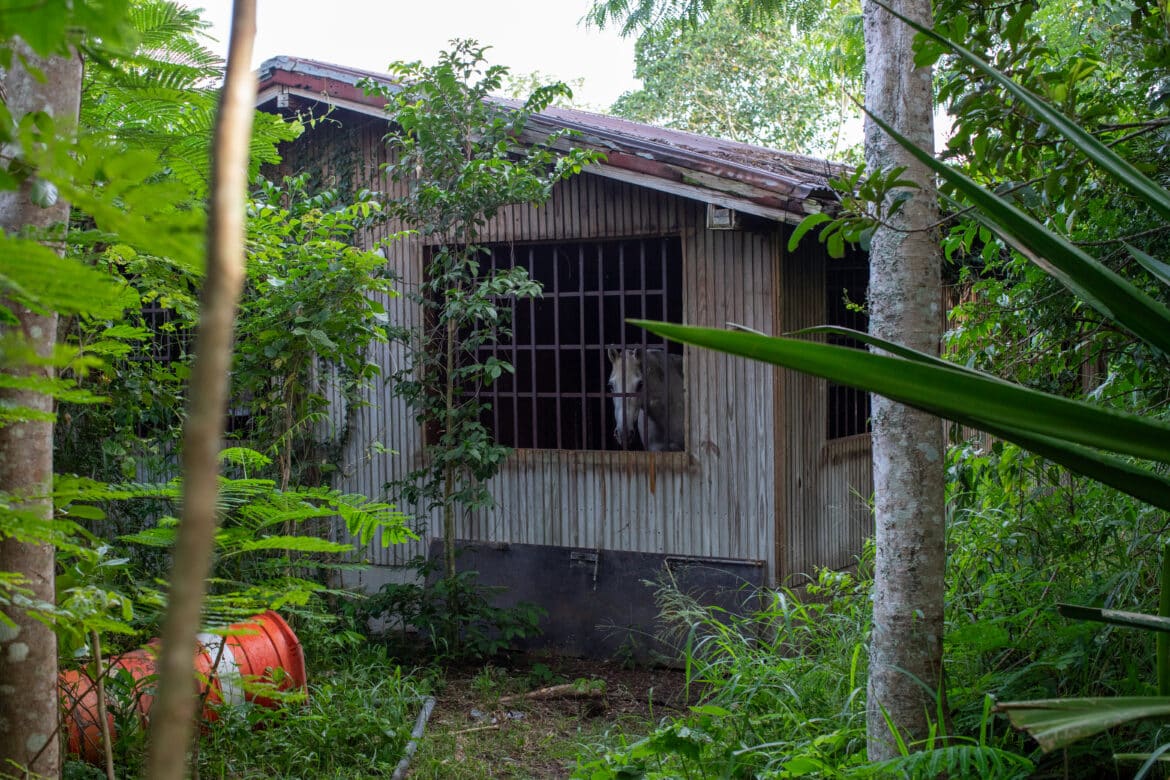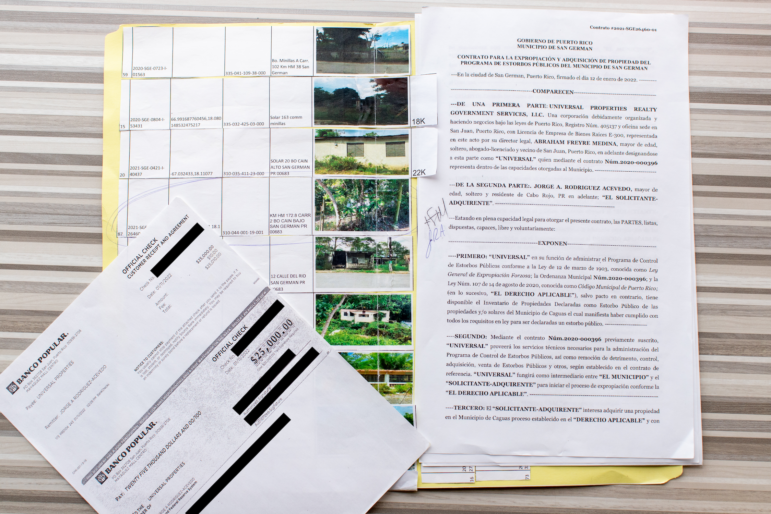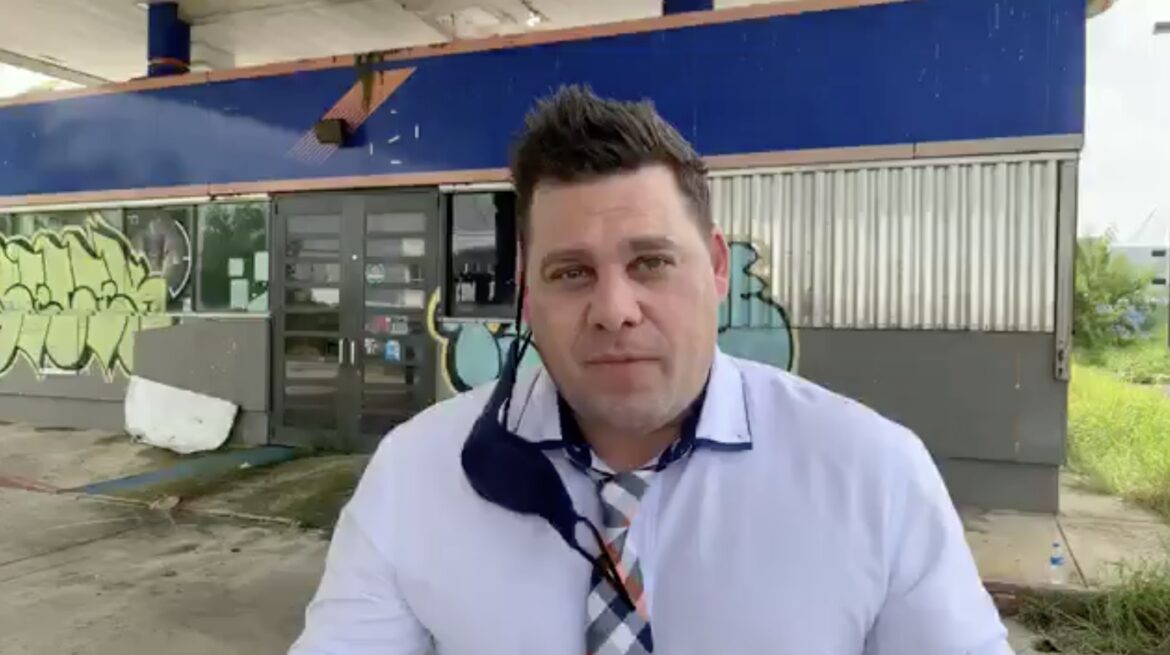For eight years, Jorge A. Rodríguez Acevedo, a 26-year-old teacher at a private school, saved money with his partner to buy their first home. The young couple saw it as an opportunity to buy a house that, even if it was in poor condition, cost less than the alternatives in the market, and that, little by little, they could repair and reach their dream of establishing a home.
So, they chose a property from the Municipality of San Germán’s Public Nuisance Program within their budget. On January 12, 2022, the educator signed an expropriation and acquisition contract with Universal Properties Realty Government Services LLC., a company hired by the municipality to manage public nuisances, and under the promise that they would deliver the house to him in nine months, gave them $25,000, which was the couple’s savings.
Almost two years into the process, the couple has neither a home nor savings. They called every two weeks to find out the status of their case. At first, the company justified itself with the argument that they had many backlogged cases, but then they began to push back the date to complete the expropriation and hand the property over to them. When that new date expired, they were told that it would take longer, and they extended it to a new term.
“They told us, ‘This document is missing,’ or they didn’t even answer. This company was never open [with us]. They gave you a phone number where someone answered, ‘I don’t have full access, call this other number,’ and that other number never answered. We couldn’t do much. They didn’t give us the house, they didn’t return the money to us, and they still owe us $25,000,” Rodríguez Acevedo said in an interview with the Center for Investigative Journalism (CPI, in Spanish).

Photo by Gabriela Michele Ros | Centro de Periodismo Investigativo
Rodríguez Acevedo’s concern worsened when allegations of irregularities by Universal Properties Realty in the management and disposal of public nuisances were published, which led to the company’s referral to the Department of Justice. However, when the couple called to follow up on the case, the response was still that the process was still ongoing.
In August, Jorge and his partner found out that the Municipality of San Germán, in the western central region, had canceled the contract and sued Universal Properties Realty. From that moment on, they lost all communication since the number of Universal’s contact person in San Germán was disconnected and, at the central offices, they promised to contact them with information, but they never did.
In talks with municipal officials, the young teacher learned that contrary to what he had been told, the company never presented the request for forced expropriation of the property in Court.
“Either the property or the money. They can’t keep both things because that’s stealing from me and my family,” said Rodríguez Acevedo, who pointed out Universal Properties Realty and the Municipality of San Germán as responsible.
Rodríguez Acevedo is one of several buyers who don’t know when they will recover the money they gave the company for a property. Several mayors, who hired Universal’s services, mentioned at least 96 cases of buyers who gave money to the company and have not gotten the properties transferred in their names or their money back.

Photo by Gabriela Michele Ros | Centro de Periodismo Investigativo
Universal Properties Realty offered properties for sale from a list of public nuisances offered by the municipality. It wrote up future sales contracts, and collected money in advance from buyers, but did not deposit it in an escrow account (a special account required by law and separate from the company’s account) so that it would be available in case the sale was not finalized. The company admitted to the Municipality of Caguas that it used part of the money for its operational expenses and argued, then, that it was not a requirement to have an escrow account.
The company argued that its duty was as a facilitator between the municipality and the buyer, with the responsibility to assist “the municipality in the entire procedure, both administrative and judicial, for the forced expropriation of the property and its subsequent transfer to the interested buyer. In other words, UPRGS [Universal Properties] does not perform real estate agent duties but is the intermediary between the MAC [Autonomous Municipality of Caguas, in Spanish] and a third party,” states the letter sent by the company to the Municipality requesting reconsideration of the cancellation of its contract in May.
However, in 19 of the 22 contracts that Universal Properties Realty signed with several municipalities, it assured that the buyers’ money would be deposited in an escrow account, the CPI found. The special account is also mentioned in all service proposals with municipalities that the CPI reviewed. Depositing money in an escrow account does not appear in the contracts signed with the municipalities of Caguas, Morovis, and Guánica in 2021, but it does appear in the proposals that are attached to those contracts.
Universal Properties Realty and the municipalities that hired its services were negligent in not maintaining an escrow account to guarantee the availability of the money paid as a purchase option for public nuisances, according to experts the CPI consulted. This omission fails to comply with Act 10 of 1994, which regulates the real estate business in Puerto Rico.

Video screenshot
On May 31, 2023, Jeanice Rodríguez Pagán and her spouse Luis A. Dávila Ortiz filed a lawsuit for collection of money, breach of contract and damages against Universal Properties and against the Municipality of Arroyo, in the South Coast. They demand payment of $140,000 that they paid the company for a property that was never delivered to them, and to be compensated for the damages caused to the family that has been deprived of getting a new property.
On April 20, 2022, the couple paid $90,000 to buy a house in the Ancones de Arroyo neighborhood. Several months later, they saw that the structure was being renovated. Universal Properties Realty told them that the improvements were being done by their staff, but then the couple learned that its owner sold the property to someone else, according to the Municipal Revenue Collection Center’s website. When they asked for their money back, Universal Properties Realty sent a check for $20,000 only, so they chose to go to court.
The lawsuit argues precisely that the checks the couple delivered to Universal Properties Realty were not deposited in an escrow account as required by law but in the company’s regular account. The Municipality of Arroyo is co-defendant because the company was acting on their behalf.
Every broker, salesperson, and real estate company must have an active escrow account if they are using their brokerage license. That is where the funds mentioned in Act 10 are deposited, the president of the Puerto Rico Association of Realtors, Melissa Montero, told the CPI.
“Those accounts can be audited by the Department of Consumer Affairs and the Examining Board. They have no choice,” said Montero.
The municipalities had to adequately supervise faithful compliance with the contract and ensure that the company periodically reported on its efforts and on the money they received as a down payment on the properties declared nuisances, said Dr. Palmira N. Ríos González, academic researcher and former president of the Inter-American Network for Public Administration Education.
“This level of negligence, because the term is negligence, is the worst thing about public administration because it is contrary to the basic principle that tells us that, if you’re going to start a project, whatever it may be, you must have an implementation, evaluation, and monitoring plan for it. If things aren’t working out as expected, you stop, adjust, and move on. There’s nothing wrong with that,” said Ríos González.
While it is true that Universal Properties Realty received money from individuals and private entities interested in buying the nuisances, the properties for sale are considered public because — upon being expropriated — the municipality gets ownership, immediate possession, and use of the property and even the Court orders the Property Registry to register it in favor of the municipality.
“They manage the municipality’s property,” said the retired professor.
The municipalities — listed as co-defendants in several lawsuits — risk assuming Universal Properties Realty’s debts to those who buy public nuisances.
The Penal Code establishes among the Crimes against Public Office that a less serious crime will be incurred by “any public official or employee who, through action or omission and on purpose, knowingly or recklessly, fails to comply with a duty imposed by law or regulation and, as a consequence of such omission results in loss of public funds or damage to public property.”
Caguas Mayor William Miranda Torres, signed Resolution 17 this past Monday, which creates a special fund of $656,600 to compensate for grievances as a mechanism to address “citizen claims resulting from the acts or omissions of the Universal Properties Realty Government Services corporation.” In addition, the measure establishes that at the time of the contract’s cancellation, the company had signed 31 purchase agreements with third-party buyers without starting the judicial process. At least 21 of these buyers have notified the municipality of their intention to walk away from buying the property.
Puerto Rico Mayors Federation president Gabriel Hernández Rodríguez, said for small municipalities, with limited staff, hiring private companies to manage public nuisance programs can be an effective alternative, but only if the municipality oversees and guarantees the purity of the contracted services.
“We can’t leave everything in the hands of the private entity,” the Mayor of Camuy said in an interview with the CPI. He said this service is provided by the nonprofit Centro para la Reconstrucción del Hábitat Inc. in his town, which only participates in the first phase of identifying nuisances and has no participation in the expropriation process.
The CPI interviewed five public nuisance buyers who are owed down payment money, and all said they are concerned that neither the company nor the municipalities will respond. There are at least six lawsuits against Universal Properties Realty for collection of money and breach of contract from individuals and corporations, who include as co-defendants the municipalities where the public nuisances are. Three other lawsuits for similar scenarios have already been decided in Court. As of press time, the company had not responded to the CPI’s request for comments on these allegations.
Universal Properties Realty also faces lawsuits from the municipalities of Caguas, San Germán and Guayama, which claim breaches of contract, among other allegations. The Municipality of Humacao also sued for the return of the files of the public nuisance cases and breach of contract in November 2021. The Court ruled in favor of the municipality.
On September 26, 2023, the Municipality of Guayama requested an injunction for Universal to hand over all the files related to the public nuisances it handled and for it to record in Court the money the company got from the property buyers. It also seeks $2 million in damages.
The municipality alleges that they had no knowledge or participation in these sales contracts. The municipal administration estimates that there are 40 cases. The court hearing last Wednesday was suspended because the company had not been able to be summoned. The mayor of Guayama, O’brain Vázquez Molina, told the CPI that the summons was subsequently served.
San Germán Mayor Virgilio Dávila Dávila said in an interview with the CPI that in his municipality, there are 15 people to whom Universal Properties owes money. Among those affected are small businesses and an elderly couple who took out a personal loan of $30,000 to buy a property, the mayor said.
“At first, they began to return the money, even with bad checks, but at the end, the company told us that, in fact, they ran out of money and that they were looking for investors to inject money into the company. Clearly, they spent the money on other things [..] At the end of the day, the municipality will respond,” he assured.
The mayor delegated to the lawyers handling the municipal lawsuit to complete the files of the 15 third-party buyers so they can be part of the court case, to whom Universal Properties Realty must return $389,574. The lawsuit against Universal is for $1,872,267.
Another municipality that is considering suing is Toa Alta, in the North central region, Mayor Clemente “Chito” Agosto confirmed. After the contract was canceled, the company disappeared.
“So far, four cases of people claiming to have paid Universal Properties Realty directly have been reported. The company collected this money in an improper way, depriving these people of the property they intended to buy and without getting their money back,” said the mayor.
Guánica Mayor Ismael Rodríguez told the CPI that in his town, there were 20 cases in which Universal Properties Realty had not returned their money, but that because of his staff’s efforts, the money was returned to 18 buyers.
“There are only two left. We have had problems with them because they delivered bad checks,” Rodríguez said.
In the case of Arroyo, the municipal administration decided to cancel the contract with Universal Properties Realty after learning that the company had filed four expropriation appeals in Court on behalf of the municipality without its consent.
The municipality’s lawyer, Luis Ortiz Carrasquillo, said the company never responded to the requests that, since February 2023, the city council made to return the property inventory and status of the completed procedures. He said the municipality intends to withdraw the expropriation cases that Universal submitted.
The municipalities of Loíza, Canóvanas, Cidra and Morovis, which had contracts with the company, said they have no cases of people to whom Universal owes money. The mayors of Juncos and Aibonito, Alfredo Alejandro and William Alicea Pérez did not want to comment, supposedly so as not to affect the ongoing investigation in the Department of Justice.
Universal files countersuit against Caguas for ‘spurring contract cancellation by other municipalities’
Universal Properties held the Municipality of Caguas responsible for the domino effect in contract cancellations it has had in recent months, as argued in a lawsuit filed against the city council for collection of money, breach of contract, and damages.
The case filed on August 21, 2023, asks that the court order the municipality to comply with the contract, be allowed to continue the processes, finalize the transactions, and charge for those services. In addition, they request that they pay $2,295,000 for expenses incurred and damages caused another $6,465,000 that the company says it stopped earning, and $500,000 for penalties for recklessness, costs, and expenses of attorneys’ fees.
For the investigating officer of the Municipality of Caguas, Alex Rivera Longchamps, the Universal Properties Realty lawsuit is “an exercise in futility.”
Of 22 municipalities that initially contracted the services of Universal Properties, only Las Piedras and Aibonito are still in effect, according to the Comptroller’s Office contract registry. Morovis appears with an active contract, but its mayor, Carmen Maldonado, told the CPI that it was canceled.
Próximo en la serie
2 / 8
¡APOYA AL CENTRO DE PERIODISMO INVESTIGATIVO!
Necesitamos tu apoyo para seguir haciendo y ampliando nuestro trabajo.


